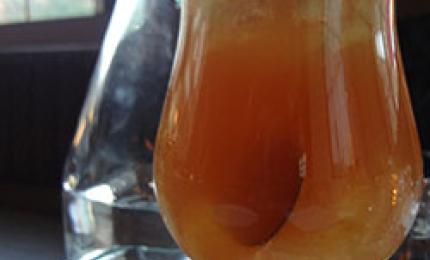The following questions are intended to enhance reading group discussions.
1. Lizzie goes from Gallagher to Chicago and then on to Wilmington and finally to pre-Katrina New Orleans. Are the settings important to this story?
2. What did you think about the FBI's COINTELPRO program? Were the tactics used an appropriate response to perceived domestic threats?
3. Early in the book, Quinn tells Lizzie that she is sometimes "too damn nice." Do you think this is true? Does she become less nice?
4. Do you think Quinn was dishonest when he failed to tell Lizzie about his father earlier in their relationship?
5. Lizzie has been reading books about relationships since she and Quinn became romantically involved. Do you think she has learned anything useful? Do you think this relationship would survive in real life?
6. What did you think of the other characters that Lizzie encountered: Nico Mancini? Sonny Germano? Kyle Sheppard? Robert Montgomery? Tad Duncan? Percy and Earl?
7. Do you agree with Lizzie and Tess that sometimes women allow their relationships with men to affect their friendships with other women?
8. What do you think the friendships of Becca, JoJo, and Naomi might have been like when they were young women?
9. Aside from Lizzie's relationship with her mother, Becca, this book contains a number of other parent-child relationships. How did you feel about the various parent-child relationships you encountered?
10. Reuben James is shot down in the first chapter of this book. By the end of the book, we know why he died. Does the responsibility for his death rest only with the person who shot him?
11. A member of the writing group that the author belongs to described Becca as "evil." What did you think of Becca?
12. What ethical dilemmas do the various characters have to deal with in this book?
13. What are the major themes in this book?
14. Which of the characters -- other than Lizzie and Quinn -- would you like to know more about? Spend time with? Avoid at all costs?
The following links and other information will provide readers with additional information about the topics, events, and setting that appear in You Should Have Died on Monday.

Blues Music
Links to sites of interest on blues history:
http://www.history-of-rock.com/blues.htm
http://afroamhistory.about.com/od/bluesmusic/a/bluesmusic.htm
To shop for classic blues, try the Library of Congress Shop:
http://www.loc.gov/shop/index.php?action=cCatalog.showSubCategory&cid=13&scid=91
For a guide to books about the blues, try Chicago Public Radio:
http://www.chicagopublicradio.org/programs/cominhome/bluesbiblio.asp
Other books about the blues:
Gussow, Adam (2002) Seems Like Murder Here: Southern Violence and the Blues Tradition. Chicago: University of Chicago Press.
Knight, Richard (2003) The Blues Highway: New Orleans to Chicago, 2nd. Ed. Trailblazers Publications.
Mosley, Walter (1995) RL's Dream: A Novel. New York: W. W. Norton & Co.
Gangsters
Michigan State University Libraries provide excellent resources to organized crime:
http://www.lib.msu.edu/harris23/crimjust/orgcrime.htm
See Crime Magazine for a variety of articles on organized crime:
http://www.crimemagazine.com/organized.htm
This site provides a brief bio of Dion O'Bannion:
http://www.irish-mafia-exposed.com/dionobannion.html
Finally, this site provides a chronology of mob history:
http://www.onewal.com/maf-chr3.html
The 1960s
This additional source was contributed by Hannah Bass, who discovered it while doing research for a school history project. This is a fantastic overview of the historic events, music, fashion and art that defined the 60s. Thank you, Hannah.
https://theweedblog.com/culture/60s-flower-power
See the wonderful Kingwood College Library site on the 1960s:
http://kclibrary.nhmccd.edu/decade60.html
For the history of the Civil Rights movement in song go to the Smithsonian:
http://www.smithsonianglobalsound.org/cultural_heritage_03.aspx
See the PBS documentary "RFK" about Robert Kennedy. This site also includes additional information about the 1960s:
http://www.pbs.org/wgbh/amex/rfk/filmmore/index.html
The Black Panthers
See this site for Black Panther Party Research Project at Stanford University:
http://www.stanford.edu/group/blackpanthers/
Also see the UC Berkeley Library Social Activism Sound Recording Project on the Panthers (includes timeline):
http://www.lib.berkeley.edu/MRC/pacificapanthers.html
These links will take you to other sites of interest on the Black Panthers:
http://www.blackpanther.org/
http://www.marxists.org/history/usa/workers/black-panthers/
http://www.bobbyseale.com/
This link is to the FBI files on slain Black Panther Fred Hampton:
http://foia.fbi.gov/foiaindex/fredhampton.htm
The Young Lords
For information about the Young Lords see:
http://palante.org/AboutYoungLords.htm
The Federal Bureau of Investigation (FBI)
Go the FBI's official website for the agency's history:
http://www.fbi.gov/fbihistory.htm
This link will take you to the other archival documents (see Fred Hampton above) available online through the Freedom on Information Act: http://foia.fbi.gov/index.html
Settings
Chicago:
The official website for the city of Chicago, Illinois
http://egov.cityofchicago.org/city/webportal/home.do
For blues in Chicago, see the Chicago Public Library Archives:
http://www.chipublib.org/001hwlc/vpablues/cba.html
See this site for the history of Bronzeville, the African American neighborhood:
http://www.ci.chi.il.us/Landmarks/B/BlackMet.html
For information about Paseo Boricua (the Puerto Rican neighborhood in Chicago):
http://www.prcc-chgo.org/paseo_boricua.htm
The Chicago Historical Society is the site to for Chicago history:
http://www.chicagohs.org/
To find a thorough account of the "Trial of the Chicago Seven ":
http://www.law.umkc.edu/faculty/projects/ftrials/Chicago7/chicago7.html
For more on the Democratic Convention in Chicago in 1968 see:
http://www.cnn.com/ALLPOLITICS/1996/conventions/chicago/facts/chicago68/index.shtml
Wilmington:
The official website for the city of Wilmington, North Carolina:
http://egov.cityofchicago.org/city/webportal/home.do
The Visitors Bureau for Wilmington:
http://egov.cityofchicago.org/city/webportal/home.do
For information on the Wilmington Riot of 1898, see this report from the Riot Commission:
http://www.ah.dcr.state.nc.us/1898-wrrc/report/report.htm
For more on African American history in Wilmington:
http://www.wilmingtontoday.com/History/AfricanAmerican.html
New Orleans:
The official website for the city of New Orleans, Louisiana:
http://www.cityofno.com/
The NOLA site for all things New Orleans:
http://www.nola.com/
For a guide to the French Quarter go to this site:
http://www.frenchquarter.com/
For a sampling of New Orleans blues musicians:
http://www.rhapsody.com/blues/neworleansblues
See this site for information about New Orleans cemeteries:
http://www.experienceneworleans.com/deadcity.html
This site has images of New Orleans jazz funerals:
http://www.cajunimages.com/jazz_funerals.htm


